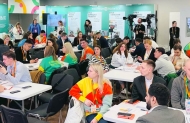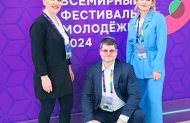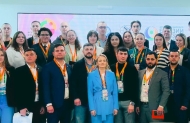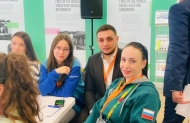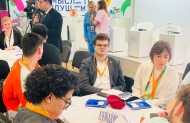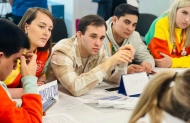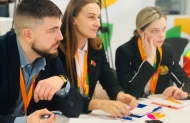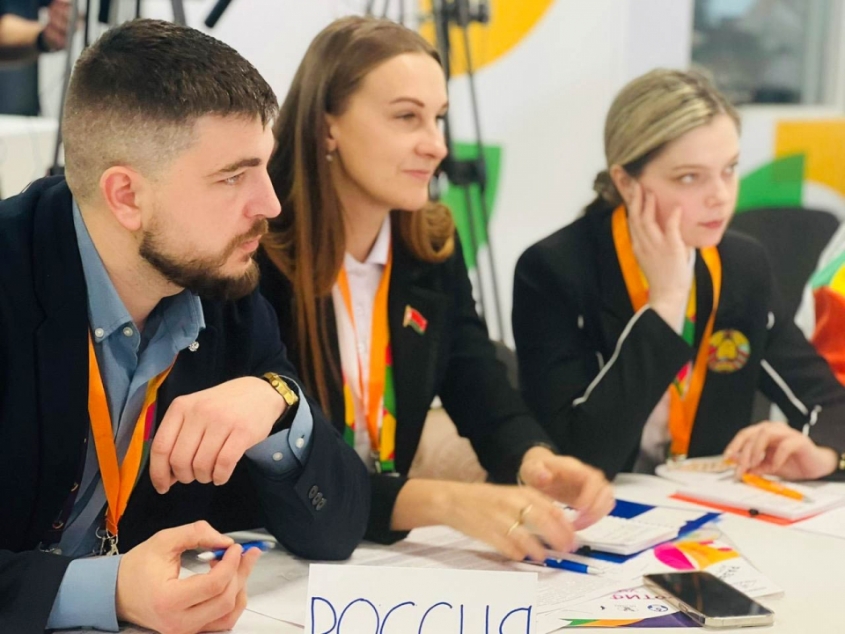
Young people from 8 countries of the world took part in the Business Game “CIS Model”, which was held as part of the World Youth Festival in Sochi on March 2, 2024.
Having reincarnated as Presidents of states, ministers, advisers, diplomats, young people from Armenia, Belarus, Kazakhstan, Kyrgyzstan, Moldova, Russia, Tunisia, Turkmenistan gathered at one table, in the format of a business game, to develop a Decision of the Council of Heads of State of the CIS “On comprehensive cooperation of states- participants of the Commonwealth of Independent States in the scientific and educational fields."
The Model was organized by the International Union of Non-Governmental Organizations "Eurasian Peoples' Assembly" together with partners: the Executive Committee of the Commonwealth of Independent States, the Moscow State Institute of International Relations of the Russian Ministry of Foreign Affairs and the Chamber of Young Legislators under the Federation Council of the Federal Assembly of the Russian Federation.
Before the game, the Secretary General of the CIS Sergei Lebedev, the Secretary General of the Eurasian Peoples' Assembly Andrei Belyaninov and the member of the Supreme Advisory Council of the Eurasian Peoples' Assembly, Chairman of the Council of the Assembly of the People of Kyrgyzstan Almambet Matubraimov addressed to the participants.
Sergei Lebedev: “Our strategic documents provide for the preservation and development of a common humanitarian space, education and strengthening of tolerance in national and religious issues, respect for the culture, languages, history and traditions of other peoples, as well as cultural exchange. The Concept for the Further Development of the CIS, updated in 2020, aims to involve the younger generation in multilateral co-operation in the most important areas of inter-State relations.”
Andrey Belyaninov: “I know that together we can solve our common problems. Resolve differences, restore relationships and continue to build a multipolar world.”
Almambet Matubraimov: “Public diplomacy is a strategic reserve for the development of CIS cooperation, using this language of public diplomacy it is easier to build relationships based on the deep roots of our countries.”
Moderators and experts were able to create an atmosphere of constructive dialogue on the site. The head of the Model - First Deputy Head of the General Secretariat of the Eurasian Peoples' Assembly, Director of the ANO "Eurasian Center for Project Initiatives" Natalia Zabolotskikh, talking about the rules of the game, regulations, distribution of roles, introduced the platform’s guests from Kyrgyzstan and Tajikistan, who came to wish success to the participants.
Marat Tagaev, Deputy Minister of Culture, Information, Sports and Youth Policy of the Kyrgyz Republic: “Let today's game be a source of inspiration and motivation for each of you. And we hope that after this event you will return to your countries with new knowledge, innovations and initiatives to implement positive changes.”
Shabnam Rahimzoda, First Deputy Chairman of the Committee on Youth and Sports Affairs under the Government of the Republic of Tajikistan:
“I would like each of you to seriously delve into your role, since not only the youth of the future, but also the youth of today play an important role. Because in many countries, even young people work in government positions. And it is very important for the country that decisions of a political and humanitarian nature are made by young people. And if today we feel ourselves in these high positions, we study the pressing issues of today’s world, and the issues that concern our countries in terms of international relations, promoting sustainable peace in the region, then we will find new ways, new tools for the development of multilateral relations.”
Divided into several groups, young people (in the role of high-ranking politicians) collectively discussed and sought solutions on three issues:
• Student academic mobility within the CIS;
• Creation of a unified scientific space in the CIS for young scientists;
• Youth cooperation within the CIS at international forums and conferences.
As a result, the participants developed a common document - the Decision, which includes an action plan for comprehensive cooperation between the CIS member states.
According to the experts of the “CIS Model” Game, the ideas of young people and the proposed tools are constructive. Among them are:
- Increasing quotas for students studying abroad;
- Increasing the number of public universities included in the CIS network university and increasing the number of training programs in accordance with the priorities of the countries;
- Development of adaptive course programs for studying the culture and language of the country of study;
- Creation of an Internet portal for students’ scientific works;
- Creation of a single open platform for the exchange of scientific achievements, knowledge and contacts;
- Creation of scientific headquarters on the basis of academic institutes of the CIS countries;
- Development of a system of grant support for young scientists;
- Conducting a scientific congress of young scientists from the CIS countries.
As the organizers - representatives of the Eurasian Peoples' Assembly, the CIS Executive Committee, MGIMO of the Ministry of Foreign Affairs of the Russian Federation and the Chamber of Young Legislators under the Federation Council of the Federal Assembly of the Russian Federation - said, the atmosphere at the site was very trusting and interested. “It was clear how much young people from different countries wanted to be heard, how eager they were to share their thoughts, ideas and best practices. It was very pleasant to realize that we have very thoughtful young people,” - said Olga Nefedova, coordinator of the platform, Deputy Head of the General Secretariat of the Eurasian Peoples’ Assembly.
During the game, the guys worked as a team, but the experts assessed the actions of the young “politicians” and “diplomats” according to the following parameters: eloquence, theoretical and legal training, leadership qualities, and the art of negotiations.
As a result, the winners of the Business Game “CIS Model” were:
- Retkova Alina Andreevna - Belarus
- Bakhchenyan Artur Sarkisovich - Russia
- Khamraev Azizbek Anvarovich – Uzbekistan
The winners received Diplomas from the International Union of Non-Governmental Organizations "Eurasian Peoples' Assembly", memorable gifts, and were marked with badges - the symbols of the Assembly.
Partners of the Eurasian Peoples' Assembly - representatives of MGIMO and the Chamber of Young Legislators under the Federation Council of the Federal Assembly of the Russian Federation also noted activists from different countries.
The Head of the game “CIS Model” - First Deputy Head of the General Secretariat of the Eurasian Peoples’ Assembly, Director of the ANO “Eurasian Center for Project Initiatives” Natalia Zabolotskikh, summing up the work of the dialogue platform, outlined the most important results, the main values of the work done:
“The business game “CIS Model” allowed participants to better understand the positions of the CIS member states and think about options for solving problems in developing cooperation between countries in the field of higher education and science, as one of the forms of further integration. In my opinion, the young people participating in the game were able to formulate proposals in a short time that could ensure the transfer of scientific knowledge and contribute to the formation of a sustainable system of networking between universities. It was interesting to note that representatives of all countries emphasized the role of knowledge and education as a value, as a source of development and progress for the entire Commonwealth.”
The document - the Decision - will be submitted to the CIS Executive Committee for further consideration and will serve as a guide when making decisions in the field of international youth policy.



